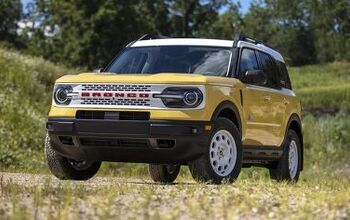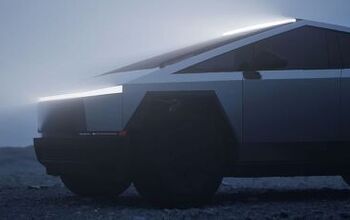VW's Klingler: Nobody Wants EVs, Except Governments

I’ve always maintained that despite green noises about electric cars, Volkswagen, deep in their Wolfsburg hearts, doesn’t believe in them. Because they don’t make sense. If they are too expensive, people won’t buy them. Volkswagen has ample experience in this arena, probably more than anybody else. Ages ago, VW built a fuel-sipping 3 liter Lupo (3 liter / 100 km, 78 mpg.) The press lapped it up. The greenies creamed in their pants. Focus groups swore they’ll buy it, no matter the cost. They lied. In the showroom, the 3 Liter Lupo was a dud: Advanced materials had made it light, but also expensive. Customer reaction: “Interesting. Now how about that red GTI over there?”
Now finally, someone high up at Volkswagen has the guts to say it: Volkswagen doesn’t build electric cars because the customer wants them. Volkswagen makes EVs because the government demands them.
Compared to a 3 liter Lupo, plugins are sheer lunacy. Even more expensive than a space-age material car. Weighed down by a huge and expensive battery. Should come with a factory-standard Prozac-dispenser to ease customer anxiety about getting home before the battery runs out. The EV is supposedly for city dwellers. Seen any jacks on the street or in public garages?
For public consumption, CEO Martin Winterkorn displayed enthusiasm for the future of electric cars, both in general and as a part of VW’s strategy. Now his sales chief Christian Klinger went on record that the electric emperor is in the nude.
It came “as a bit of a contradictory shock” to the EV-fansite Plugincars “to hear Volkswagen’s Board Member responsible for sales, Christian Klingler, express emotions bordering on outright hostility regarding the future of electric cars.” In a roundtable discussion during the media launch for the electric Golf in Germany no less. At this occasion, Klingler said how he really feels:
“The electric car is not a request from the customer, the electric car is a request from the government,” said Klingler. He also said that there is no market demand for electric cars.
Apart from making no economic sense, Klingler thinks that an electric car makes even less ecologic sense: “We have to find a solution how the electricity is produced because CO2 shouldn’t go into the air when electricity is produced,” he said. “When you buy an electric car in China, you can be sure you have 118 to 200 grams of CO2 produced per kilometer, which is twice what you have from a normal engine, so why should you do it?”
Way back, when I still wrote for instead of about Volkswagen, I wrote in an officially sanctioned Volkswagen book: “Battery powered electric cars don’t produce any direct emissions. Nevertheless, the power must be created somewhere. If you are taking a hard look at it, pollutant emissions are simply moved from the tailpipe to the smokestack.” These facts haven’t changed.
Volkswagen has always been pretty good and forthright about the ecologic impact of a car. They have a whole environmental department, launched way back in 1971. One of its jobs is to draw up an “Öko-Bilanz” for each car, an ecological balance sheet from cradle to grave, from production to the shredder, from emissions during painting to emissions during driving. They are doing a good and honest job.
When green was just a color, Volkswagen already had a two water system in Wolfsburg, a grey water system to flush the toilet and to use in production, and a clean water system for drinking. Volkswagen had taken the environment seriously before it was fashionable. Being old hands at it, they also are pretty realistic.
Plugincars was shocked and incredulous when Klingler said “no, there is no study” that proves that well-to-wheel, an EV is kinder to the environment than a modern clean ICE powered car.
Even Edmunds, usually one of the saner publications, is perturbed: “Bad timing for an executive whose company had just flown a dozen U.S. automotive writers to Germany to participate in one of VW’s first major media briefings on its e-Mobility electric-drive program.”
Edmunds spins a tale of an internal schism between “the company’s product development and sales units.” I don’t buy it. Internal schisms at Volkswagen exist like they do at any company. But they are not put in a press release. This one was intentional.
Wrote a still depressed Plugincars: “Essentially I’ve come away from the roundtable thinking that VW will build an electric car, but they don’t really want to and they are using old and, at this point, mostly dismissed, notions to say why potential customers won’t want them. It kind of felt like GM and their self-destructive marketing message with the EV1.“
We’ll see. I usually needle VW for their “we’ll rule the world” hubris. But writing for Thetruthaboutcars, I applaud Klingler for his guts and candor.

Bertel Schmitt comes back to journalism after taking a 35 year break in advertising and marketing. He ran and owned advertising agencies in Duesseldorf, Germany, and New York City. Volkswagen A.G. was Bertel's most important corporate account. Schmitt's advertising and marketing career touched many corners of the industry with a special focus on automotive products and services. Since 2004, he lives in Japan and China with his wife <a href="http://www.tomokoandbertel.com"> Tomoko </a>. Bertel Schmitt is a founding board member of the <a href="http://www.offshoresuperseries.com"> Offshore Super Series </a>, an American offshore powerboat racing organization. He is co-owner of the racing team Typhoon.
More by Bertel Schmitt
Latest Car Reviews
Read moreLatest Product Reviews
Read moreRecent Comments
- AZFelix I have always wondered if the poor ability of Tesla cars in detecting children was due to their using camera only systems. Optical geometry explains that a child half the height of an adult seems to have the same height as that same adult standing twice as far away from the viewer.
- 28-Cars-Later Actually pretty appealing (apparently I'm doing this now). On a similar note, a friend of mine had a difficult situation with a tenant which led to eviction and apparently the tenant has abandoned a 2007 Jag S-Type with unknown miles in the garage so he called me for an opinion. Before checking I said $2-3 max, low and behold I'm just that good with the 3.0L clocking in at $2,3 on average (oddly the 4.2 V8 version only pulls $2,9ish) and S-Types after MY05 are supposedly decent.
- DO I have owned a 2012 LR4 since day one and it has been the best vehicle I have ever had the pleasure of having in the garage. I know how easy it is to hate on Land Rover but this LR4 is comfortable, has a ton of storage room and is so versatile. With 110k miles, mine is now relegated to ‘other’ car use but is still the go to for off road adventures and snow runs. Nice to see one featured here - I think they are so underrated.
- Tane94 I'd be curious to know whether 87 octane is no longer the most popular grade of gasoline by sales volume. My Costco often runs out of Premium grade and I suspect 93 octane might now be the most popular grade of gas. Paying 40-50 cents more per gallon 87 vs 93 octane because of turbo engines is the real story
- Redapple2 125 large? You re getting into 911 territory.


































Comments
Join the conversation
This is a nice thread, because it well illustrates how much "green technology" is the product of little more than wishful thinking. E.g. "when someone gets the electric car right, there will be tons of demand?" True enough, and the people buying them will be all those folks who bought the gas engine cars that made use of the 100 mpg carburetor after the oil-automotive cartel was finally cornered by the government and forced to bring it to market. The basic problem with electric cars is that batteries have a much lower energy density than fuels. So, electric cars are extraordinarily inefficient because a very substantial portion of their weight is battery. The best that can be said for electric cars is that they may be a transition to fuel cell cars, which use electricity derived from a chemical reaction that produces mostly water vapor. In the short run, if the goal is to reduce pollution, why isn't a natural gas powered car the answer? The technology is mature, and filling up your NGV is, in fact, easier and faster than recharging the battery. You can even do it at home. The NGV isn't quite CO2-free, but its probably no worse than an electric car powered by natural-gas generated electricity . . . and probably better than an electric car powered by coal-generated electricity, and nukes have other problems, like the fact that nuclear electricity can't exist without subsidies because of market concerns about waste disposal and accidents. I can understand the VW guy's frustration. From his perspective -- and most -- EVs are a government-mandated blind alley. If the goal is to reduce fuel consumption (and, hence, pollution assorted with moving the vehicle), the most fruitful paths are increasing engine efficiency (if ceramics can ever be adapted to ICE use, thermal efficiency will go way up, with a corresponding reduction in fuel consumption) and reducing weight through use of exotic materials and design. Unlike with batteries, which are a pretty mature technology, volume production will bring the unit cost of these other features down. But, thanks to governments, car makers are forced to spend the R&D money on EVs rather than on other, more promising technologies. Now, I'm just waiting for someone to say, "But EVs of the future will be powered by solar, wind and biomass electricity!" Yeah, right.
But power plants run at a way higher efficiency than cars do--not having to move around, they can be designed to do little but efficiently turn fuel into power. Lost rates along electric lines are less than a percent. This is why a full charge on an EV costs far less than an equivalent amount of distance would cost in terms of gas. And if you live in a region, like, say, Germany, where wind power is taking off, the beginning to end emissions are zero, modulo what went into making the power lines and the cars themselves. The claim that power plant emission is as bad as car emission is like saying that secondhand smoke a few times a month has as many health risks as being a chain smoker.